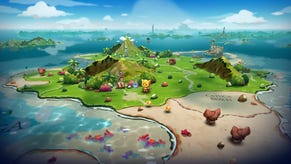How green is the games industry?
Eurogamer speaks to the big players.
Inspired partly by the Green Party's triumph in Eurogamer's home constituency of Brighton Pavilion, and more truthfully by Ubisoft's decision to ditch game manuals, we've been ringing round the games industry to learn what publishers and platform holders are doing to make their businesses more environmentally friendly.
Ubisoft threw down the leafy gauntlet in April by announcing the removal of paper manuals from retail game boxes. This comparatively pioneering step will be demonstrated this autumn by Shaun White Snowboarding. The game will use a digital in-game manual instead.
Ubisoft also plans to use DVD cases made only from recycled plastic. The boxes housing Splinter Cell: Conviction were the first examples of this.
The world's biggest publisher, Activision Blizzard, has said nothing about scrapping paper game manuals, but did say that environmentally-friendly packaging was used "whenever possible".
Activision Blizzard uses Amaray's EcoLite DVD cases for Xbox 360, Wii, DS and PS2 games. The publisher "expects" to add PS3 and PSP to that list "in 2010". EcoLite cases are 20 per cent lighter than normal and fully recyclable.
Activision Blizzard also uses "soy-based inks" for printing, and all publisher peripherals are tested for toxic substances and materials to make sure they comply with laws.
Electronic Arts told Eurogamer a Biobox had been used for games since August 2008 in Europe. This is made of 50 per cent recycled plastic and has a bio additive that breaks the plastic down if buried in a landfill. Over 15 million games have been shipped in the Biobox. EA is looking to bring down the weight of the box from 50g in 2010.
EA whipped all instruction manuals out of budget PC games one year ago, saving the printing of around two million manuals, but didn't mention removing paper manuals from fully-priced games.
SEGA, Codemasters and Capcom refused to comment, while 2K Games didn't return comment. Clearly this doesn't mean the companies hate trees and bears, but it is worth noting nonetheless.
Of the three platform-holders, only Sony Computer Entertainment offered a detailed comment. Coincidentally, Greenpeace found Sony to be the most eco-friendly of the trio in a December 2009 report.
Sony said PlayStation 3 consoles use 55 per cent less energy now than at launch. "We are also working on further reductions for the future," the company added. Revisions to PS2 hardware have brought power consumption down by 70 per cent.
PS3s built after November 2008 have an option to enable the console to power down and enter standby mode when idle. "We are also working on a number of future energy-saving ideas to reduce the power our products use," Sony assured us.
Hardware revisions mean the latest PS2 weighs 72 per cent less than the original mode, the PSP 34 per cent less and the PS3 30 per cent less, and lighter machines use less plastic.
Sony also boycotts the use of harmful plastics and has created the "first and largest" pan-European recycling program to collect "waste consoles" from from houses. Sony also helps make chairs from recycled plastic, although hasn't commented on scrapping paper manuals yet.
Nintendo told Eurogamer it had "no plans to move away from including [paper] instruction manuals with our packaged software". Nintendo distributes all Wii and DS games, and pointed us towards the published Corporate Social Responsibility (CSR) report online for more detail.
This begins: "As part of our commitment to preserve a healthy planet for future generations, we at Nintendo recognise our social responsibility to protect the environment and take positive steps to conduct business with due concern for the environment."
In Greenpeace's December 2009 report, Nintendo finished bottom of the pile. The Mario-maker scored "bad" in 10 out of 15 areas, and "partially bad" in the remaining five. In no area did Nintendo score "partially good" or "good".
The company's better areas were product power consumption and chemical use. Among Nintendo's worst areas were recycled materials, renewable energy and C02 emissions. The CSR report shows a slight (around 1 per cent) rise in C02 emissions. Nintendo puts this down to a growing workforce and increased production.
Nintendo promised to design for "recyclability" and look into the "degradability" of products. And "every effort" is going into reducing energy and resource consumption of packaging materials. A pan-European recycling initiative has been begun by Nintendo, too.
The CSR report said "environmental considerations" like "energy-saving practices" and "effective use of resources" are a "core focus".
Microsoft failed to return comment. Microsoft was in second to last position in Greenpeace's December 2009 report.
Corporate giant Microsoft does have a fleshed-out "environment" section on its website, however, detailing a wide range of initiatives expected from a mature, high-profile company.
Specific to Xbox 360 are a dramatic change in how many broken consoles are recycled: 28 per cent in 2010 compared to 2 per cent in 2005. The Xbox 360 also uses less power now than at launch - although this may be offset by some users leaving the machine on to download games and demos remotely.
"We have reduced the energy use of the console during active game play by over 30 per cent," the website states. "We have banned the use of PVC in the packaging, reduced the packaging size of the original Xbox by approximately 30 per cent, and employed the sustainable EnviroShell product."
Xbox 360 innards have gradually been replaced to be more reliable and run cooler to avoid hiccups. Also, an Xbox 360 Slim is expected to be unveiled at E3.
The website goes on to reveal that Bill Gates' replacement Steve Ballmer told staff carbon emissions must drop 30 per cent by 2012 (compared to 2007 levels). "We'll achieve this goal by improving energy use in our buildings and operations, reducing air travel, and increasing our use of renewable energy."
As the eyes of the world are drawn ever more closely to environmental matters, companies like Nintendo, Microsoft and Sony, and companies like Activision, EA and Ubisoft will be called upon to set the agenda for the gaming industry. Ubisoft has made a strong and positive start.








